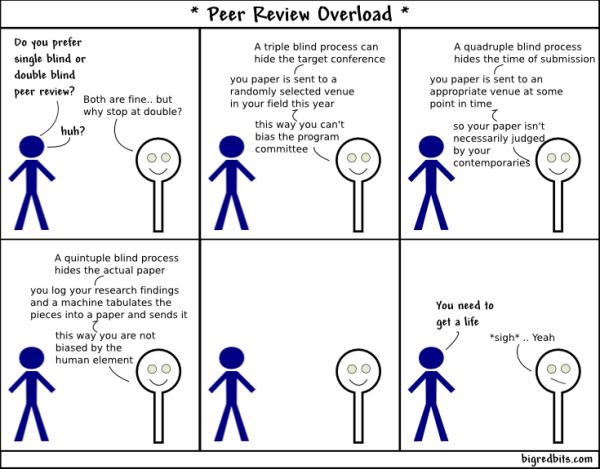
Puedes escuchar aquí la opinión de nuestro Vicerrector de Investigación sobre los últimos recortes y su influencia en la actividad docente e investigadora de nuestra casa. (Declaraciones a Cadena Ser el 22/05/2012).

 "If 'peer review was a drug it would never be allowed onto the market' affirmed
Drummond Rennie (Smith, 2010, p.1), deputy editor of the Journal Of the American
Medical Association and who intellectually provided support for the international
congresses of peer review that have been held, since 1989, every four years. If peer
review was a drug, he added, it 'would not get onto the market because we have no
convincing evidence of its benefits but a lot of evidence of its flaws'." (Ibid)
"If 'peer review was a drug it would never be allowed onto the market' affirmed
Drummond Rennie (Smith, 2010, p.1), deputy editor of the Journal Of the American
Medical Association and who intellectually provided support for the international
congresses of peer review that have been held, since 1989, every four years. If peer
review was a drug, he added, it 'would not get onto the market because we have no
convincing evidence of its benefits but a lot of evidence of its flaws'." (Ibid) Los porcentajes tan reducidos de incorporación de doctores a las empresas españolas hacen replantearse si la orientación del actual doctorado es la correcta. En realidad, ésta no es una cuestión española exclusivamente. Salvo en los países emergentes, las empresas no son capaces de absorber todos los doctorados que se generan, al menos no estos doctorados... También es verdad que en el caso español, concurren dos circunstancias diría que propias: a) que esto parece no frenar la "producción de doctores"; b) que la presencia de doctores en empresas en otros países es ya mucho más elevada que en el caso español. En 2011 se aprobó un nuevo Real Decreto para el doctorado. ¿Se aprovechará para hacer las reformas necesarias para acercar de una vez en España el doctorado a la empresa privada?
Los porcentajes tan reducidos de incorporación de doctores a las empresas españolas hacen replantearse si la orientación del actual doctorado es la correcta. En realidad, ésta no es una cuestión española exclusivamente. Salvo en los países emergentes, las empresas no son capaces de absorber todos los doctorados que se generan, al menos no estos doctorados... También es verdad que en el caso español, concurren dos circunstancias diría que propias: a) que esto parece no frenar la "producción de doctores"; b) que la presencia de doctores en empresas en otros países es ya mucho más elevada que en el caso español. En 2011 se aprobó un nuevo Real Decreto para el doctorado. ¿Se aprovechará para hacer las reformas necesarias para acercar de una vez en España el doctorado a la empresa privada? Después de la clase tan útil sobre Proyectos de Investigación y sobre EBTs de ayer martes, que esperamos que aclarara dudas, vamos a centrarnos el próximo día en diversos aspectos de la carrera de un científico. ¿Esto es hablar de algo que atañe a uno mucho, verdad? Calentemos motores: leamos estas entradas del blog de contenidos y las lecturas que cuelgan de ellas. Discutimos todo la semana que viene y vemos si hay razones para ser optimista o pesimista...
Después de la clase tan útil sobre Proyectos de Investigación y sobre EBTs de ayer martes, que esperamos que aclarara dudas, vamos a centrarnos el próximo día en diversos aspectos de la carrera de un científico. ¿Esto es hablar de algo que atañe a uno mucho, verdad? Calentemos motores: leamos estas entradas del blog de contenidos y las lecturas que cuelgan de ellas. Discutimos todo la semana que viene y vemos si hay razones para ser optimista o pesimista... Bien sea en forma de patente, de empresa de base tecnológica o simplemente como resultado de un contrato entre la UPNA y un tercero, nuestro Departamento ha sido muy productivo en los últimos años en la generación de resultados de transferencia de tecnología.
Bien sea en forma de patente, de empresa de base tecnológica o simplemente como resultado de un contrato entre la UPNA y un tercero, nuestro Departamento ha sido muy productivo en los últimos años en la generación de resultados de transferencia de tecnología.